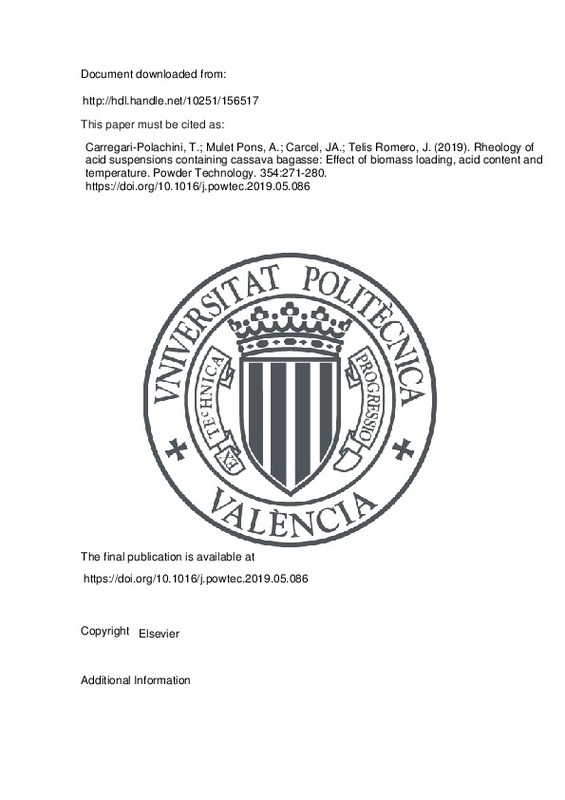JavaScript is disabled for your browser. Some features of this site may not work without it.
Buscar en RiuNet
Listar
Mi cuenta
Estadísticas
Ayuda RiuNet
Admin. UPV
Rheology of acid suspensions containing cassava bagasse: Effect of biomass loading, acid content and temperature
Mostrar el registro sencillo del ítem
Ficheros en el ítem
| dc.contributor.author | Carregari-Polachini, T.
|
es_ES |
| dc.contributor.author | Mulet Pons, Antonio
|
es_ES |
| dc.contributor.author | Carcel, Juan A.
|
es_ES |
| dc.contributor.author | Telis Romero, J.
|
es_ES |
| dc.date.accessioned | 2020-12-05T04:33:00Z | |
| dc.date.available | 2020-12-05T04:33:00Z | |
| dc.date.issued | 2019-09 | es_ES |
| dc.identifier.issn | 0032-5910 | es_ES |
| dc.identifier.uri | http://hdl.handle.net/10251/156517 | |
| dc.description.abstract | [EN] Understanding the characterization and rheological behavior of acid suspensions of cassava bagasse provides essential information for the design of conversion processes. Samples with different cassava bagasse concentrations (0-10% w.w-1), phosphoric acid (0-10% w.w(-1)) at temperatures between 278.13 and 318.13 K were submitted to steady-state flow over a wide range of shear rates (1-265 s(-1)). The biomass particles had considerable residual starch (similar to 50% db), low lignin content and adequate particle size (<200 mu m) for the conversion process. Flow curves were well-fitted to the Herschel-Bulkley model, presenting a Newtonian domain at low solids and acid content and a non-Newtonian behavior with noticeable yield stress and shear-thinning characteristic (n < 1) at above 6% of cassava bagasse. Resistance to flow increased as the solids loading and acid content increased. Temperature dependence could be expressed as a function of an Arrhenius-type equation with good accuracy of fit. (C) 2019 Elsevier B.V. All rights reserved. | es_ES |
| dc.description.sponsorship | The authors would like to thank Prof. Rosiane Lopes Cunha and Prof. Ana Carla Kawazoe Sato from University of Campinas (UNICAMP) for their support with particle size analyses. The authors also acknowledge the Sao Paulo Research Foundation - FAPESP (Grant number 2017/06518-2) and the Coordination for the Improvement of Higher Education Personnel -CAPES (Grant number 88881.132626/2016-01) for their financial support. | es_ES |
| dc.language | Inglés | es_ES |
| dc.publisher | Elsevier | es_ES |
| dc.relation.ispartof | Powder Technology | es_ES |
| dc.rights | Reconocimiento - No comercial - Sin obra derivada (by-nc-nd) | es_ES |
| dc.subject | Lignocellulose | es_ES |
| dc.subject | Residual starch | es_ES |
| dc.subject | Apparent viscosity | es_ES |
| dc.subject | Herschel-Bulkley model | es_ES |
| dc.subject | Shear-thinning | es_ES |
| dc.subject | Arrhenius-type equation | es_ES |
| dc.subject.classification | TECNOLOGIA DE ALIMENTOS | es_ES |
| dc.title | Rheology of acid suspensions containing cassava bagasse: Effect of biomass loading, acid content and temperature | es_ES |
| dc.type | Artículo | es_ES |
| dc.identifier.doi | 10.1016/j.powtec.2019.05.086 | es_ES |
| dc.relation.projectID | info:eu-repo/grantAgreement/FAPESP//2017%2F06518-2/ | es_ES |
| dc.relation.projectID | info:eu-repo/grantAgreement/CAPES//88881.132626%2F2016-01/ | es_ES |
| dc.rights.accessRights | Abierto | es_ES |
| dc.contributor.affiliation | Universitat Politècnica de València. Departamento de Tecnología de Alimentos - Departament de Tecnologia d'Aliments | es_ES |
| dc.description.bibliographicCitation | Carregari-Polachini, T.; Mulet Pons, A.; Carcel, JA.; Telis Romero, J. (2019). Rheology of acid suspensions containing cassava bagasse: Effect of biomass loading, acid content and temperature. Powder Technology. 354:271-280. https://doi.org/10.1016/j.powtec.2019.05.086 | es_ES |
| dc.description.accrualMethod | S | es_ES |
| dc.relation.publisherversion | https://doi.org/10.1016/j.powtec.2019.05.086 | es_ES |
| dc.description.upvformatpinicio | 271 | es_ES |
| dc.description.upvformatpfin | 280 | es_ES |
| dc.type.version | info:eu-repo/semantics/publishedVersion | es_ES |
| dc.description.volume | 354 | es_ES |
| dc.relation.pasarela | S\398946 | es_ES |
| dc.contributor.funder | Fundação de Amparo à Pesquisa do Estado de São Paulo | es_ES |
| dc.contributor.funder | Coordenaçao de Aperfeiçoamento de Pessoal de Nível Superior, Brasil | es_ES |
| dc.subject.ods | 08.- Fomentar el crecimiento económico sostenido, inclusivo y sostenible, el empleo pleno y productivo, y el trabajo decente para todos | es_ES |







![[Cerrado]](/themes/UPV/images/candado.png)

